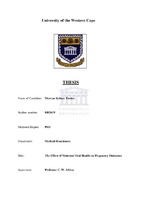| dc.contributor.advisor | Africa, Charlene | |
| dc.contributor.author | Turton, Mervyn Sydney | |
| dc.date.accessioned | 2015-08-06T11:07:10Z | |
| dc.date.available | 2015-08-06T11:07:10Z | |
| dc.date.issued | 2014 | |
| dc.identifier.uri | http://hdl.handle.net/11394/4360 | |
| dc.description | Philosophiae Doctor - PhD | en_US |
| dc.description.abstract | Adverse pregnancy outcomes such as preterm birth and low birth weight are major causes of maternal and neonatal morbidity and mortality. Increasing evidence points to an association between periodontal disease and adverse pregnancy outcomes and thus a better understanding of the nature of this association will assist in treatment planning to reduce adverse pregnancy outcomes. Among the Gram-negative anaerobic bacteria frequently associated with periodontal disease are Treponema denticola, Tannerella forsythia and Porphyromonas gingivalis which may be detected in plaque using the BANA test (N-benzoyl-DL-arginine-2-naphthylamide). The aim of this study was to investigate the effect of periodontal disease on pregnancy outcomes and evaluate the use of BANA as a screening test for the risk of adverse pregnancy outcomes. This study complied with the Declaration of Helsinki (2013) and included 443 pregnant women attending ante-natal clinics in KwaZulu Natal. At first visit, maternal oral health status was assessed by the measurement of periodontal indices and BANA testing of dental plaque from the same teeth. Patient demography and medical history were obtained by means of a questionnaire and all data compared with pregnancy outcomes. While controlling for other factors, significant differences were found between the distributions of periodontal disease at BANA-negative and BANA-positive sites and between infant birth weight and maternal periodontal index scores such as plaque index and gingival index. The birth weight and gestational age at delivery of infants born of BANA-positive periodontally diseased mothers were significantly lower than those born of BANA-negative mothers with no periodontal disease. We may conclude that the presence of periodontal disease during pregnancy has a significant association with negative pregnancy outcomes and suggest that the risk for adverse pregnancy outcomes may be reduced by monitoring the oral health status of women during pregnancy. | en_US |
| dc.language.iso | en | en_US |
| dc.publisher | University of the Western Cape | en_US |
| dc.subject | BANA | en_US |
| dc.subject | Periodontal disease | en_US |
| dc.subject | Low birth weight | en_US |
| dc.title | The effect of maternal oral health on pregnancy outcomes | en_US |
| dc.rights.holder | University of the Western Cape | en_US |

